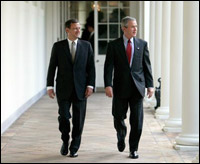
John G. Roberts (left) and President
Bush.
Photo: The White House/Eric Draper.
Not only are the far-right Family Research Council and the biz-friendly U.S. Chamber of Commerce raving about President Bush’s nominee for the Supreme Court, but plenty of liberals have glowing words for John G. Roberts Jr. too. Georgetown law professor Richard Lazarus, a Democrat and environmental lawyer who’s known Roberts since their days together at Harvard Law School, enthusiastically told National Public Radio that Roberts is a “very decent, a very fair-minded individual … he’s obviously an incredibly smart person.”
There’s no joy to be found in environmental-activist circles, however, where the nomination has been greeted with cautious but real anxiety. Roberts has had a long and shiny career as part of D.C.’s conservative legal elite, including stints as a political appointee in both the Reagan and George H. W. Bush administrations and stretches as a successful corporate lawyer, but only two years of judicial experience on the U.S. Court of Appeals for the District of Columbia Circuit. So eco-advocates are sifting through the records of his cases and decisions, trying to read the tea leaves on what sorts of havoc might be wreaked on the environment by a nominee who’s gotten a thumbs-up from Pat Robertson.
In 2002, Roberts stepped in for his friend Lazarus, who had a teaching conflict, to argue in front of the Supreme Court on behalf of the Tahoe Regional Planning Authority, successfully defending the agency’s right to restrict development around Lake Tahoe. The court’s decision in the case was considered a major setback for the property-rights movement.
Judging from Republican talking points on Roberts, which stress bringing up the Tahoe case whenever his environmental values are questioned, this may be the isolated bright spot in a gloomy — if thin — environmental record.
As deputy solicitor general under the first Bush administration, Roberts successfully argued before the Supreme Court in 1990 that members of the National Wildlife Federation did not have standing to sue the federal government over a mining project on public land.*

Roberts (left) and Bush, out for a stroll.
Photo: The White House/Eric Draper.
In 2001, Roberts filed an amicus brief on behalf of the mining industry arguing that West Virginia citizens whose health and property were damaged by mountaintop-removal mining had no right to sue the state for damages in federal court under the federal Surface Mining Control and Reclamation Act. The 4th Circuit Court of Appeals agreed, ruling against the citizen plaintiffs, and in the process overturning an earlier lower-court decision on a similar case in favor of citizen suits by a federal district court in West Virginia.
In 2003, as a judge, Roberts was a dissenter in the D.C. Circuit Court’s 5-3 denial of a request to rehear its decision calling for the public release of Vice President Dick Cheney’s energy task-force records — essentially siding with the Bush administration on the matter. And in 2004’s Sierra Club v. EPA, he rejected a lawsuit by the Sierra Club that sought to compel the U.S. EPA to more stringently regulate emissions of hazardous air pollutants from copper smelters.
The Case of the Hapless Toad
But the bellwether case that’s really raising the hair on the back of conservationists’ necks is one that involves a little-known critter, and the potential for a significant challenge to the foundations of federal environmental law.
“A major question needs to be [Roberts’] views on the federal government’s authority under the commerce clause [of the Constitution] to protect clean water, endangered species, and other vital resources,” said Glenn Sugameli, senior legislative counsel with Earthjustice, a nonprofit public-interest law firm.
He’s referring to Rancho Viejo LLC v. Norton, a 2003 case before the D.C. Circuit Court in which Roberts questioned the constitutionality of protecting California’s arroyo toad from a planned development under the federal Endangered Species Act. In particular, Roberts argued that the federal government’s enforcement powers under the commerce clause might not apply in this case.
This opinion rang alarm bells for green advocates because most of the nation’s keystone environmental laws, including the Endangered Species Act, the Clean Air Act, and the Clean Water Act, derive their power from legal rulings that have upheld the constitutional authority of Congress to broadly regulate interstate commerce. Many legal attacks on the Endangered Species Act and other federal environmental laws are now aimed directly at diminishing the scope of power Congress can wield under the commerce clause.
In Rancho Viejo, Roberts dissented from the majority decision that upheld the U.S. Fish and Wildlife Service’s authority under the Endangered Species Act to protect the toad. In what are fast becoming the most famous words ever written by a judge in a minority opinion about an amphibian (and, let’s face it, the funniest), Roberts questioned how interstate commerce was relevant to the case of a one-state species: “The panel’s approach in this case leads to the result that regulating the taking of a hapless toad that, for reasons of its own, lives its entire life in California constitutes regulating ‘Commerce … among the several States.'”
Legal decisions for decades have upheld the federal government’s right to regulate air, water, wild species, and other parts of the shared environment under the commerce clause. While some experts have said that Roberts was not arguing to overturn Rancho Viejo, but rather to send it back to a lower court to find a better legal foundation for protecting the toad, his manner of dissent may indicate that he adheres to the conservative “New Federalist” legal philosophy that would limit the federal government’s ability to enforce cornerstone national environmental laws by giving more power over policy to state governments.
“No court has ever upheld a similar constitutional challenge to any federal wildlife statute,” said Sugameli, “so the context in which he wrote this is troubling. This is a very important issue which may have implications for Clean Water Act provisions that protect water and wetlands, and other potential environmental issues.”
Sugameli is not amused by Roberts’ stab at humor, either: “I think the language he used is at least flippant at best … that’s the habitat where [the toad] lives — the only habitat it can exist in. It’s not like it’s deciding, ‘Gee, I like this better than my vacation home in Florida.'”
Other green groups are also finding little to laugh at in the Roberts nomination — and yet they’re not coming out swinging in an effort to scuttle it either. The Sierra Club’s Carl Pope noted particular concerns about Roberts’ Rancho Viejo and Sierra Club v. EPA opinions, yet in a markedly tepid press release stated the club’s intention “to do a thorough review of his history both on the bench and as an attorney” and called on the Senate to do the same. Friends of the Earth echoed this approach: “We urge the Senate to proceed with caution, deliberation, and careful scrutiny as it prepares to take up the nomination of John Roberts,” read a statement from FoE President Brent Blackwelder.
While greens are being circumspect, conservatives are not. “I think it’s a question of why so many groups and individuals on the pretty extreme right when it comes to judicial issues, and a lot of people who are certainly not friends of federal environmental protections, are pushing so hard for Roberts,” said Sugameli. “Do they know something about him that we don’t?”
*[Correction, 22 Jul 2005: This article originally stated that Roberts wrote an article for Duke Law Journal supporting Justice Antonin Scalia’s majority opinion in this case, Lujan v. National Wildlife Federation. In fact, Roberts’ article was about Lujan v. Defenders of Wildlife.]



